News
October 27, 2023
I am thrilled to share with you my latest paper published in the prestigious Royal Society of Chemistry journal - Green Chemistry (IF: 9.8).
The title of the OPEN ACCESS article : "Highly transparent polyurethane thermosets with tunable properties and enzymatic degradability derived from polyols originating from hemicellulosic sugars"
In this work, a novel portfolio of highly transparent aliphatic polyurethane thermosets, synthesized under very mild conditions from 100% renewable branched polyesters, exhibiting "on demand" tunable mechanical and thermal properties and enzymatic degradability.
For more details, visit the publication link : https://doi.org/10.1039/D3GC03302C
Thanks Yosra Chebbi, Prof. Alessandra Lorenzetti and Prof. Minna Hakkarainen for your priceless contribution to this excellent study!
KTH Royal Institute of Technology
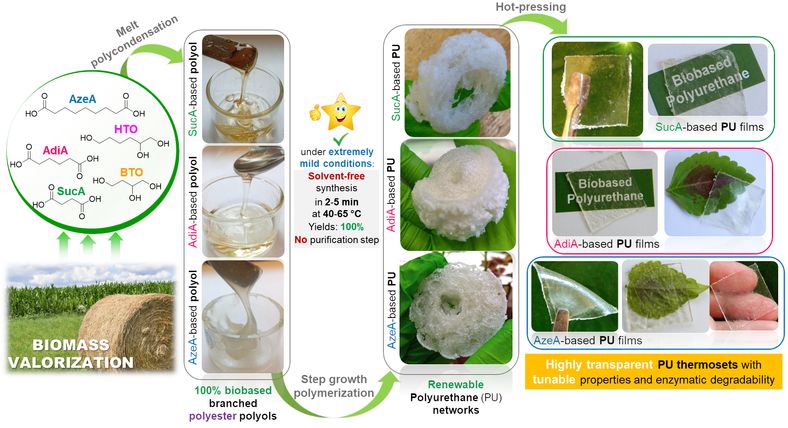
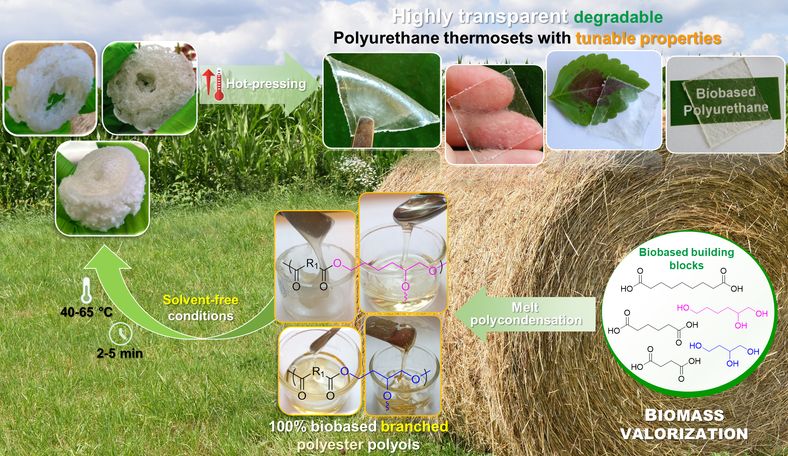

April 28, 2023
Our paper "Open-loop recycling of post-consumer PET to closed-loop chemically recyclable high-performance polyimines" published in Resources, Conservation & Recycling journal (IF: 13.716) was selected by the editors as the Cover article of the volume 193, June 2023!!
Publication link: https://lnkd.in/enjinVtz
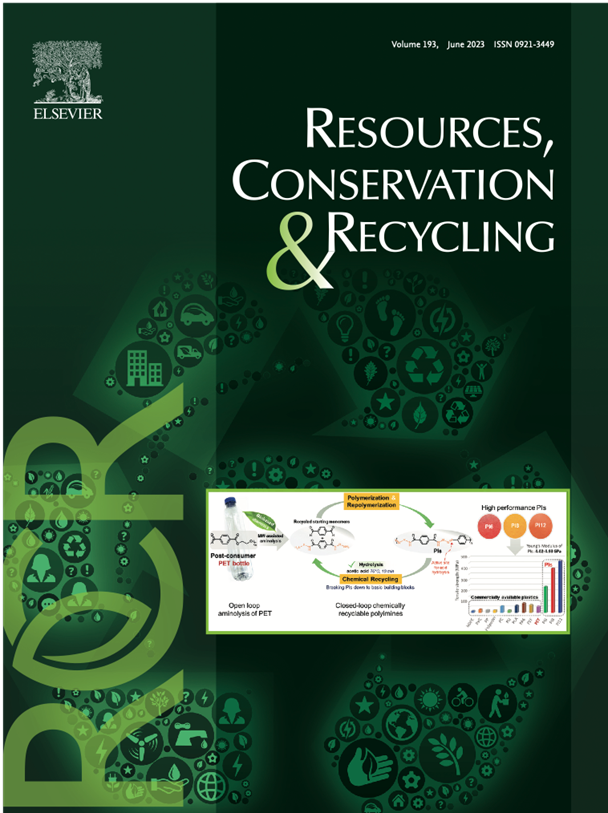
March 27, 2023
Can chemical recycling play an important role as a future end-of-life option for turning post-consumer PET bottles into very promising closed-loop recyclable polymers, thereby supporting the circular plastics economy?
The detailed answer is here in our latest contribution, recently published in the prestigious Elsevier Resources, Conservation and Recycling journal (IF: 13.716, rank: 3/110 in "Waste Management and Disposal" category).
The title of the OPEN ACCESS article : "Open-loop recycling of post-consumer PET to closed-loop chemically recyclable high-performance polyimines"
For more details, visit the publication link below: https://lnkd.in/enjinVtz
The graphical abstract is found here: https://lnkd.in/eHZ9MDWN
In this work, intriguing high-performance polyimines (PIs) were designed from diamines recovered by open-loop recycling of postconsumer PET bottles by microwave-assisted aminolysis. These new PIs had excellent thermal properties, super-high toughness and strength, very impressive strength, with Young's modulus of 4.02-4.93 GPa and tensile strength of 237-467 MPa, significantly outperforming most of available commodity plastics in the market!! They robust PIs demonstrated recyclability “on demand” to original building blocks via mild and ultrafast acetic acid catalysed hydrolysis. The recovered building blocks could be directly repolymerized back to PIs with similar properties to the original PIs, thus avoiding any additional separation process of the recycled products!! Taking advantage of their features, the newly developed PIs thermoplastics show great potential to serve as next-generation circular materials, designed from recycled plastic waste, for a wide range of practical applications.
Excited to share our findings with the academic and industrial community!!
Thanks Eva Bäckström and Prof. Minna Hakkarainen for collaborating and for your priceless contribution to this so pleasant recycling work!
KTH Royal Institute of Technology
Keywords: PET, packaging, Chemical recycling, aminolysis, Schiff-base, Dynamic covalent chemistry, Polyimine, Circular plastics economy, plastics, waste management, plastics recycling


September 13, 2022
Work in progress: Development of a new series of biobased polyurethane thermosets derived from renewable feedstocks with tunable thermal properties, optical transparency, good mechanical performance (7.3< tensile strength (MPa) <33.4 and 15.6< strain (%) <189), and promising practical applications...
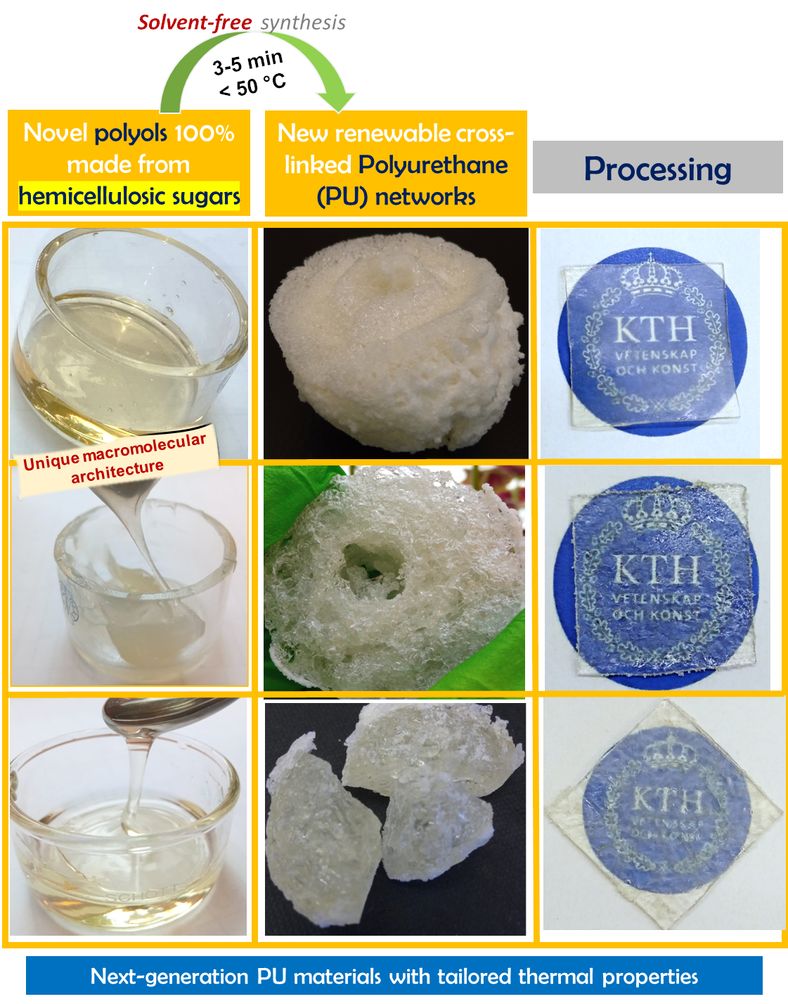
June 29, 2022
Research is currently underway in our labs to develop a new series of bio-based polyurethane (PU) thermosets with tailored thermal properties!! The solvent-free synthesis process of these cross-linked PU networks involves the use of new sustainable polyols featuring unique macromolecular architectures made 100% from biomass, particularly hemicellulosic sugars. The polymerization was successfully carried out under mild conditions (< 50 °C) and took only 5 min!! Let's move on together to greener materials in the future!!
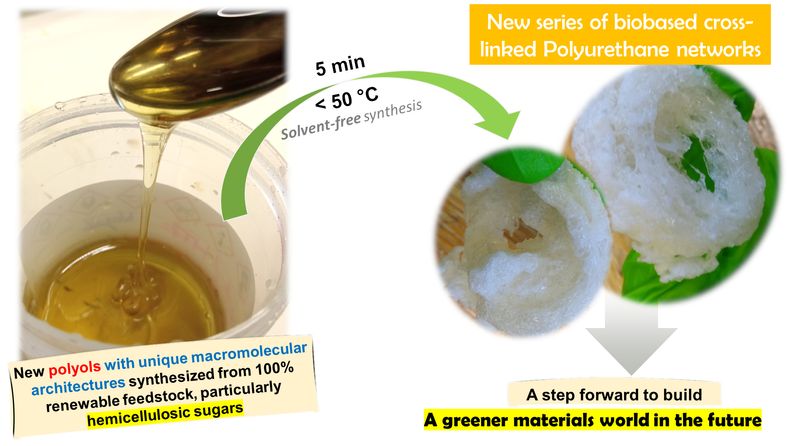
June 11, 2022
Our contribution to the development of the renewable thermoplastic polyester material, poly(lactic acid) PLLA, was recently published in International Journal of Biological Macromolecules (IF: 8.025 / Q1), in collaboration with Prof. Alejandro J. Müller from the University of the Basque Country UPV/EHU, Spain.
The title of the open access article: "Effect of the structural features of biobased linear polyester plasticizers on the crystallization of polylactides"
In this work, three new 100% biobased polyester plasticizers derived from adipic acid (AdA) were successfully employed, for the first time, to accelerate the crystallization rate and enhance the mechanical properties of polylactide (PLLA); an important step to improve its performance and expand its range of applications.
For more details, visit the link below: LINK
The addition of AdA-based plasticizers to PLLA:
> significantly increases the elongation at break up to 8 times compared to neat PLLA.
> increases the nucleation rate from the glassy state by around 50-110 %.
> causes a remarkable increase in the overall crystallization rate from the glassy state which was 2-3 times faster for the plasticized PLLAs than neat PLLA.
> decreases Tg by up to 11 ºC
Such findings make these aliphatic polyester plasticizers derived from fully renewable resources very promising for improving the properties and applications of PLA.

June 1-3, 2022
This week I presented my work entitled "Designed from Recycled PET packaging waste" at Nordic Polymer Days 2022 Conference in Gothenburg, Sweden. It has been a great opportunity to discuss with many inspiring scientists.
In this work, an efficient and fast end-of-life management of non-degradable poly(ethylene terephthalate) thermoplastic waste by chemical recycling was designed. The approach involves transforming PET waste, exemplified by a post-consumer PET bottle, by microwave-assisted solvent-free aminolysis into new value-added terephthalate diamines featuring high melting points. These monomers were then used to synthesize new aromatic-aliphatic high Tg polyimines.
Transforming post-use terephthalate packaging into new high-performance monomers and polymers with outstanding performance, rather than sending them to landfill or incineration, is a much-needed step to prevent generation of packaging waste and to reduce the fatal effects of plastic pollution on our planet.

December 21, 2021
Our latest contribution to the development of high-performance Furanoate bioplastics was published in Polymer Degradation and Stability (IF: 5.204 / best quartile journal Q1).
Article title: " Tuning thermal properties and biodegradability of poly (isosorbide azelate) by compositional control through copolymerization with 2,5-furandicarboxylic acid "
In this work, a novel fully biobased FDCA-based copolyesters series, distinguished by improved thermal performance (tunable Tg over a high and broad temperature window oscillating from 9 to 91 ° C depending on FDCA content), sustainability and enhanced susceptibility to enzymatic degradation, was synthesized by melt polycondensation ..
For more details, visit the link below: LINK
